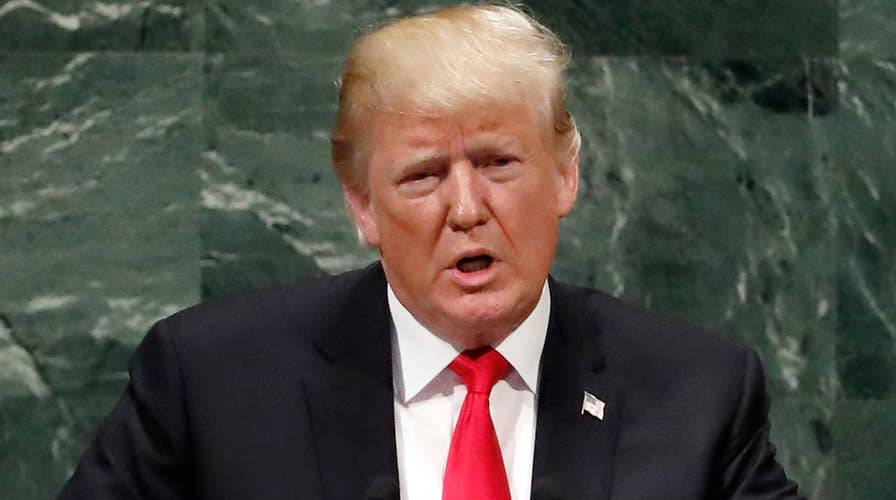Trump calls on nations to isolate Iran's regime at UN
'We cannot allow the world's leading sponsor of terrorism to possess the planet's most dangerous weapons,' President Trump says at the United Nations General Assembly.
President Trump put Iran on notice Tuesday at the U.N., and illustrated his vision for a world marked by sovereign nation states peacefully pursuing their own national interests.
In this his second speech at the U.N., Trump continued to put his approach in stark relief to that of his Democratic predecessor, Barack Obama, who often waxed poetic about “a rules-based international order” – a phrase of globaloney that simply doesn’t reflect the real world.
The globalists who comprise most of the U.N. audience laughed when Trump listed solid domestic economic accomplishments that have global implications, especially rapid economic growth, full employment for minorities and women, and record-high stocks. But grateful Americans and those around the world who wish their leaders would follow Trump’s example aren’t laughing.
Trump also showed how the United States is pursuing a foreign policy that is not interventionist, but actively pursues critical national interests just as other sovereign nations do.
For example, Trump continued to evolve our policy toward the expansionist Islamist theocracy that runs Iran from the disaster he inherited.
These basic concepts of sovereignty and eschewing interventionism are the fundamental pillars of a Trump doctrine. What progressives have dismissed as nationalism and populism is actually a return to the sovereignty of the democratic nation state.
Trump lamented Iran’s sweetheart nuclear deal from Obama and European governments that opened spigots of money while allowing Tehran to keep the key components necessary for a nuclear weapons program.
Obama also sent the Iranians a plane-load full of cash in the middle of the night; Trump referred to this “windfall for Iran’s leaders,” which they used to spread “mayhem and slaughter” around the region.
Trump has methodically replaced this policy with one of toughness, which nonetheless leaves the door open to negotiations. Trump affirmed in New York that oil sanctions would take effect on Iran in early November. (While unmentioned, the Trump administration is also debating whether to force the SWIFT system, which facilitates international financial transactions, to cut off Iran.)
All of America’s Middle East allies support us in this effort. But unpopular leaders currently running the governments of France, Germany, and the United Kingdom have not only opposed the tougher measures against Iran, but worked actively to undermine the sanctions.
Trump made clear that the United States would stick to its guns and sanction companies doing business with Iran’s government. That vow plus his explanation of Iran’s nefarious attempts to spread violent jihad around the Middle East should convince erstwhile European governments to back down.
Trump also reiterated that America is through playing the sucker on trade. The U.S. trade-in-goods deficit with China had spiraled to $376 billion in the year he took office, and the European Union’s had reached $147 billion the previous year.
Since then, Trump has reached landmark agreements with Mexico and South Korea on trade, with more agreements expected in the coming months.
Contrary to self-proclaimed “free traders” who moan that Trump is turning to protectionism (from a free trade ideal that has never actually existed), Trump made clear at the UN that the United States merely seeks “fair and reciprocal” trade arrangements – namely equivalent tariffs and the absence of other barriers to fair trade.
But the most fundamental takeaway from the speech is Trump’s focus on sovereignty, not only for America but for other countries.
He began his speech saying that the United States seeks independence and cooperation, rather than global governance and domination.
The president promised to continue his efforts to return to a traditional American foreign policy that will “not tell you how to live or worship.” He specifically rejected the “ideology of globalism,” embraced patriotism, and lamented uncontrolled immigration. Even when it comes to Iran, he called not for regime change but a change in conduct.
He also pointed out some of the many shortcomings of the United Nations, observing that he pulled the U.S. out of the Orwellian-named Human Rights Council and continues to ignore the International Criminal Court – also known as the World Court – which is more interested in prosecuting Americans than thugs.
These basic concepts of sovereignty and eschewing interventionism are the fundamental pillars of a Trump doctrine. What progressives have dismissed as nationalism and populism -- not only with Trump’s election and administration, but also with the vote in Britain to leave the globalist European Union and the election of new right-leaning leaders in many European nations -- is actually a return to the sovereignty of the democratic nation state.
As with other nations, we will decide our laws. We will decide whom to allow to immigrate. We will decide what culture we want. And we will decide our destiny. Trump has given more form to this fundamental patriotic impulse that is swelling in America and elsewhere in the world.









































